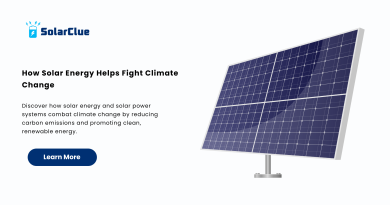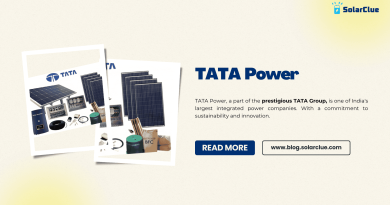How Do Solar Panels Help Save Energy?
Solar panels are not only a clean and renewable energy source but also a powerful tool for saving energy and reducing electricity bills. This blog post will explore how solar panels generate electricity, the concept of net metering, and how these technologies can lead to significant energy savings for homeowners. We’ll also discuss the role of energy efficiency, time-of-use electricity rates, and the long-term financial and environmental benefits of solar power.
Table of Contents
- 1 How Solar Panels Generate Electricity and Reduce Grid Dependency
- 1.1 The Concept of Net Metering and Its Benefits
- 1.2 Calculating Potential Energy Savings with Solar Panels
- 1.3 Combining Solar Power with Energy Efficiency Measures
- 1.4 The Impact of Time-of-Use Electricity Rates on Solar Savings
- 1.5 Government Incentives and Rebates for Solar Power
- 1.6 Long-Term Cost Savings with Solar Panels
- 1.7 The Environmental Benefits of Reducing Energy Consumption
- 1.8 Common Misconceptions About Solar Energy and Energy Savings
- 1.9 The Future of Solar Power and Its Impact on Energy Consumption
- 1.10 Comparing Energy Savings with Solar Panels
- 1.11 Conclusion
- 1.12 FAQs
How Solar Panels Generate Electricity and Reduce Grid Dependency
Solar panels generate electricity by converting sunlight into direct current (DC) electricity through the photovoltaic (PV) effect. This DC electricity is then converted into alternating current (AC) electricity by an inverter, which can be used to power your home. By producing your own electricity, solar panels reduce your dependency on the grid, leading to lower electricity bills.
| Benefit | Explanation |
|---|---|
| Reduced Grid Dependency | Solar panels generate electricity during the day, reducing the need to draw power from the grid. |
| Lower Electricity Bills | By generating your own power, you reduce the amount of electricity you need to purchase from your utility. |
The Concept of Net Metering and Its Benefits
Net metering is a billing arrangement that allows homeowners with solar panels to receive credit for the excess electricity they generate and send back to the grid. When your solar panels produce more electricity than you use, the surplus is sent to the grid, and you receive a credit on your electricity bill. During times when your solar panels aren’t generating enough power (such as at night), you can use these credits to offset your electricity consumption from the grid.
| Net Metering Benefit | Explanation |
|---|---|
| Offset Electricity Bills | Surplus electricity sent to the grid earns credits, reducing future electricity bills. |
| Financial Savings | Homeowners can significantly lower their electricity costs, especially in areas with favorable net metering policies. |
Calculating Potential Energy Savings with Solar Panels
The amount of money you can save with solar panels depends on several factors, including the size of your solar system, local electricity rates, and your household’s energy consumption.
Example Calculation:
- System Size: 5 kW
- Annual Production: 6,500 kWh
- Electricity Rate: ₹6 per kWh
- Annual Savings: 6,500 kWh * ₹6/kWh = ₹39,000
Combining Solar Power with Energy Efficiency Measures
To maximize your energy savings, it’s essential to combine solar power with energy efficiency measures. By reducing your overall energy consumption, you can ensure that your solar panels cover a larger portion of your electricity needs, leading to greater savings.
| Energy Efficiency Measure | Impact on Savings |
|---|---|
| LED Lighting | Reduces electricity use for lighting, increasing the percentage of your energy needs met by solar. |
| Energy-Efficient Appliances | Lower overall energy consumption, leading to higher solar energy utilization. |
The Impact of Time-of-Use Electricity Rates on Solar Savings
Time-of-use (TOU) electricity rates charge different prices for electricity depending on the time of day. Solar panels can help homeowners avoid higher electricity costs during peak hours by generating electricity during the day when TOU rates are typically higher.
| TOU Rate Impact | Explanation |
|---|---|
| Peak Hour Savings | Solar panels generate electricity during peak hours, reducing the need to purchase expensive electricity. |
| Off-Peak Usage | Excess solar energy generated during the day can be stored or credited for use during off-peak times. |
Government Incentives and Rebates for Solar Power
Governments around the world offer various incentives and rebates to encourage the adoption of solar power. These incentives can significantly reduce the upfront cost of installing solar panels and increase the return on investment.
| Incentive Type | Benefit |
|---|---|
| Tax Credits | Reduces the upfront cost of solar panel installation. |
| Rebates | Provides direct financial incentives for installing solar panels. |
| Subsidies | Lowers the cost of solar power systems, making them more affordable. |
Long-Term Cost Savings with Solar Panels
Investing in solar panels can lead to substantial long-term cost savings. Although the initial cost of installation can be high, solar panels typically pay for themselves within 5 to 10 years, depending on local energy costs and available incentives. After the payback period, the electricity generated by your solar panels is essentially free, leading to decades of savings.
The Environmental Benefits of Reducing Energy Consumption
By reducing reliance on the grid and lowering overall energy consumption, solar panels contribute to a reduction in greenhouse gas emissions. This helps combat climate change and reduces the environmental impact associated with traditional energy sources.
| Environmental Benefit | Explanation |
|---|---|
| Lower Carbon Footprint | Solar energy produces no direct emissions, significantly reducing your carbon footprint. |
| Conservation of Resources | Solar power reduces the need for fossil fuel extraction and combustion. |
Common Misconceptions About Solar Energy and Energy Savings
There are several misconceptions about solar energy and its potential for saving money. For example, some people believe that solar panels are too expensive to justify the investment. However, with the availability of government incentives and falling prices, solar power is becoming increasingly affordable.
The Future of Solar Power and Its Impact on Energy Consumption
As solar technology continues to advance, the efficiency of solar panels is expected to improve, making them even more cost-effective. Additionally, innovations in energy storage and smart grid technologies will allow homeowners to maximize the benefits of their solar power systems.
Comparing Energy Savings with Solar Panels
| Factor | Impact on Energy Savings |
|---|---|
| System Size | Larger systems generate more electricity, leading to greater savings. |
| Electricity Rates | Higher local electricity rates increase the value of solar savings. |
| Net Metering Policies | Favorable net metering policies can maximize financial benefits. |
| Energy Efficiency Measures | Combining solar with energy efficiency increases overall savings. |
Conclusion
Solar panels are a powerful tool for saving energy and reducing electricity bills. By generating clean, renewable electricity and taking advantage of net metering, time-of-use rates, and government incentives, homeowners can achieve significant financial and environmental benefits. As solar technology continues to improve, the potential for energy savings will only grow, making solar power an increasingly attractive option for households worldwide.
Here at SolarClue®, we offer a smart, practical, and “beautiful” solution. You will be answered for all the questions related to Solar.
We provide all kinds of brands that are the Best Solar panels in India.
If you are the one who is planning for the solar power system. Don’t hesitate to contact our team!
Looking forward to empowering you with solar energy, just like hundreds of our other clients!
FAQs
1. How do solar panels save energy?
Solar panels generate electricity from sunlight, reducing the need to purchase electricity from the grid, leading to lower energy consumption and bills.
2. What is net metering, and how does it work?
Net metering allows homeowners to send excess solar electricity back to the grid in exchange for credits on their electricity bill, offsetting future energy use.
3. Can I still save money with solar panels if I use a lot of electricity?
Yes, solar panels can offset a significant portion of your electricity consumption, and combining them with energy efficiency measures can further enhance savings.
4. How do time-of-use rates affect solar savings?
Solar panels generate electricity during the day when time-of-use rates are typically higher, helping to reduce the cost of electricity during peak hours.
5. Are there government incentives available for installing solar panels?
Yes, many governments offer tax credits, rebates, and subsidies to reduce the upfront cost of installing solar panels, making them more affordable and increasing long-term savings.


